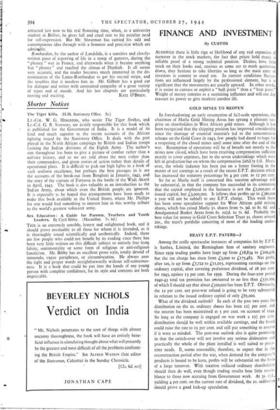FINANCE AND IN VESTMENT
By CUSTOS
AurHoirox there is little sign or likelihood of any real expansion of turnover in the stock markets, the fact that prices hold steady is reliable proof of a strong technical position. Dealers have little stock on their books and, anxious as some are to mark quotations down, they hesitate to take liberties so long as the main army of investors is content to stand pat. In current conditions fluctua- tions are influenced largely by the professional element, but it is significant that the movements are usually upward. In other words, it is easier to canvass or exploit a "bull point" than a "bear point." Weight of money remains as a sustaining influence and will one day reassert its power to give market another lift.
GOLD MINES TO REOPEN
In foreshadowing an early resumption of fu:1-scale operations, the chairman of Marlu Gold Mining Areas- has sprung a pleasant sur- prise on shareholders in West African gold mines. Although it has been recognised that the shipping position has improved considerably since the shortage of essential materials led to the concentration scheme on the Gold Coast in 1943, few people had dared to hope for a reopening of the closed mines until some time after the end of the war. Resumption of operations will be of benefit not merely to the mines now closed, which have been receiving compensation sufficient merely to cover expenses, but to the seven undertakings which were left in production but on whom the compensation liabil:ty fell. More- over, the whole industry has been put on a better footing in the matter of net earnings as a result of the recent E.P.T. decision which has increased the statutory percentage by 4 per cent. to 12 per cent.
So far as Marlu itself is concerned this taxation advantage will be substantial, in that the company has succeeded in its contention that the capital employed in the business is not the £2,000,000 of issued capital, but £3,000,000. It follows that profits up to £360,000 a year will not be subjett to any E.P.T. charge. This week there has been some speculative support for West African gold mining shares, which has raised Marlu 5s. shares from 7s. 9d. to 8s. 6d. and Amalgamated Banket Areas from 6s. mid. to 7s. 6d. Probably the best value for money is Gold Coast Selection Trust 5s. shares around 20S., the trust's portfolio consisting of most of the leading under- takings.
HEAVY E.P.T. PAYERS-2 Among the really spectacular instances of companies hit by E.P.T. is Sanbra, Limited, the Birmingham firm of sanitary engineers.
Since 1939 trading profits have leapt up from £18,834 to £209,436, but the tax charge has risen from £3,00o to £r75,483. Net profit, after tax, is up from £7,722 to £11,015, representing earnings on the ordinary capital, after covering preference dividend, of 28 per cent.
for 1943, against 13 per cent. for 1939. During the four-year period 1940-43 total tax provision has amounted to no less than £531,000,
of which I should say that about £5oo,000 has been E.P.T. Obviously, the to per cent, net post-war refund is going to be very substantial in relation to the issued ordinary capital of only £65,000.
What of the dividend outlook? In each of the past two years the distribution on the Is. ordinary shares has been 121 per cent. and the interim has been maintained at 5 per cent, on account of 1944. So long as the company is engaged on war work a 121- per cent. distribution should be well within available earnings, and the board could raise the rate to 15 per cent. and still put something to reserve if it were so minded. The post-war outlook also is quite promising in that the switch-over will not involve any serious dislocation and practically the whole of the plant installed is well suited to peace- time needs. kseems reasonable, therefore, to expect that in the reconstruction period after the war, when demand for the company's products is bound to be keen, profits will be substantial on the basis of a large turnover. With taxation reduced ordinary shareholders should then do well, even though trading results bear little resem- blance to those now accruing from Government work. At 3s. lid., yielding 4 per cent, on the current rate of dividend, the is. ordinaries should prove a good lock-up speculation.


























 Previous page
Previous page